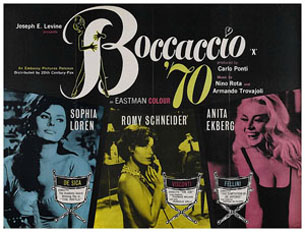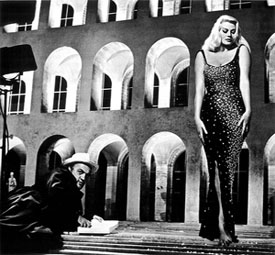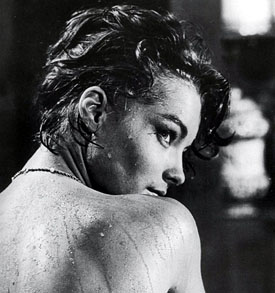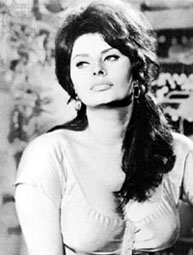Imagine if today, a producer managed to round up the likes of David Lynch, Darren Aronofsky, Martin Scorsese, and Clint Eastwood to each direct a film for an anthology picture. Surely something like this would be difficult to pull off, but in 1962 Italy, that’s exactly what happened when producers Antonio Cervi and Carlo Ponti brought Federico Fellini, Vittorio De Sica, Luchino Visconti, and Mario Monicelli together to make Boccaccio ’70, a collection of four short films that shine the spotlight on the fairer sex.
The film opens with Mario Monicelli’s Renzo and Luciana, whose title couple are about to get married. Due to them both working together at a business that frowns upon inter-office relationships, they must keep their love affair a secret, which leaves Luciana open to the advances  of all sorts of men, including her boss. Their home life isn’t much better, as while they work to pay off their loans and get their finances in order, they’re staying with Luciana’s family in a very small apartment, which leads to little private time between the two. It seems at every turn, life is working against the newlyweds at having a storybook romance.
of all sorts of men, including her boss. Their home life isn’t much better, as while they work to pay off their loans and get their finances in order, they’re staying with Luciana’s family in a very small apartment, which leads to little private time between the two. It seems at every turn, life is working against the newlyweds at having a storybook romance.
Renzo and Luciana is the weakest portion of the film, but that isn’t to say it’s particularly bad. At roughly 40 minutes, it doesn’t overstay its welcome, and is a nice, harmless way to kick off the anthology. Performances from the two leads, Marisa Solinas and Germano Gilioli are strong, and Monicelli does a nice job of showing that while in the 60s many still had the preconceived notion that the man wore the pants in a relationship, behind closed doors it was a much different story. The film also carries a solid “the more things change, the more they stay the same” message, as regardless of where the two find themselves, it always seems difficult to connect on the emotional level they long for. It’s interesting to note that this story was cut from the US release of the film, although I doubt it had anything to do with the quality of the production, and was done more so to trim the running time.
Next up is the finest contribution to Boccaccio ’70, and it should come as no surprise it comes way of Federico Fellini. The Temptations of Dr. Antonio is a story about a man (if you hadn’t guessed yet, it’s Dr. Antonio), who is a heavily religious man, one that is extremely involved and concerned about the morals of Rome. Everywhere he turns, he sees obscene material, from provocative shots of women on magazine covers displayed at newsstands to women parading around in restaurants in low-cut dresses. Surprisingly, he’s well respected among government officials for his crusade, and seems to have no trouble putting a stop to any filth he finds. That is until one day, a massive billboard is erected in a field in front of his apartment advertising milk. Seems harmless enough, but Anita Ekberg is the model in the ad,  and with the leg and cleavage she’s showing off, it’s absolutely unacceptable to Dr. Antonio, especially since he sees it every time he walks past one of his windows. His cries to tear it down fall on deaf ears, and having to see that unsightly image begins to drive him mad; so mad, that he Ms. Ekberg herself is going to have to see what all the fuss is about in person.
and with the leg and cleavage she’s showing off, it’s absolutely unacceptable to Dr. Antonio, especially since he sees it every time he walks past one of his windows. His cries to tear it down fall on deaf ears, and having to see that unsightly image begins to drive him mad; so mad, that he Ms. Ekberg herself is going to have to see what all the fuss is about in person.
I’ve seen a good amount of Fellini’s catalog, and I must say that The Temptations of Dr. Antonio is easily one of the most entertaining offerings from his storied career. The smile on my face rarely fell throughout the nearly hour-long segment, and I genuinely laughed out loud on more than one occasion. Fellini is at his most absurd and creative best here, utilizing wonderfully effective B-movie style effects that completely work since the film is very tongue-in-cheek. One of my favorite scenes is the actual construction of the billboard, which features nothing less than a boy scout troop, dancing children playing ring-around-the-rosie, a random jazz band and an overall spectacle-like circus-feel that’s a true delight to watch, and really shows that Fellini can direct a busy scene like no other. Ekberg is great in her role, and plays it up to the fullest, as does Peppino De Fillipo (Dr. Antonio), whose portrayal as a righteous, uptight defender of decency works hand-and-hand with Fellini’s commentary on censorship and the silliness of advertising to create a masterpiece of short-form cinema.
The Temptations of Dr. Antonio is a hard act to follow up, but Luchino Visconti tries his best with The Job. Ottavio is a young member of Italy’s aristocracy, and has just been thrust into the media spotlight after being caught up in a scandal that involves him and a number of prostitutes. This doesn’t bode well for his relationship with his wife Pupe, whose father arranged the marriage between them as a way for his family to attain a bit of power. He’s also quite wealthy, and Ottavio’s taste for the high-life relies heavily on the marriage succeeding.  Ottavio convenes with his lawyers to deny the scandal, attempting to save face with not only all of Rome but his wife as well. It’s a little too late however, as Pupe has been out and about for the past two days, and has already made contact with the ladies Ottavio has been linked to. She knows all of it is true, but surprisingly doesn’t seem very broken up about it. In fact, it’s opened her eyes to the world, and she’s decided instead of living off of her father’s wealth, she’s going to become her own woman, and find herself an honest job.
Ottavio convenes with his lawyers to deny the scandal, attempting to save face with not only all of Rome but his wife as well. It’s a little too late however, as Pupe has been out and about for the past two days, and has already made contact with the ladies Ottavio has been linked to. She knows all of it is true, but surprisingly doesn’t seem very broken up about it. In fact, it’s opened her eyes to the world, and she’s decided instead of living off of her father’s wealth, she’s going to become her own woman, and find herself an honest job.
Without question the most emotionally intense segment of Boccaccio ’70, some would argue that The Job is the strongest film of the lot, although I’d have to disagree. While it’s certainly powerful, and the performances from Tomas Milian and Romy Schneider are astounding, the film left me wanting a bit. This is my first Visconti film, so I don’t know if it’s a technique he utilizes frequently, but the very deliberate, ridged direction left me feeling cold somewhat, although I’m sure that may very well have been the intended effect. The entirety of the story takes place in literally one room with two actors, lacking some variety, but also giving the proceedings an air of intimacy; you’ll almost feel as if you’re a peeping tom, witnessing something you really have no right to. The final shot is also extremely striking, and the most profound statement made in the entire film. Still, I believe the segment could have benefit from different placement, as The Temptations of Dr. Antonio is a tough act to follow, and the polar opposite tone of the two films would have been easier to digest if this came first.
Closing out the anthology is Vittorio De Sica’s The Raffle, featuring the always stunning Sophia Loren. Here she plays Zoe, a girl working the shooting gallery in a travelling carnival. She brings in players without much hassle, thanks to her good looks, provocative attire, and promiscuous demeanor. Sadly, she’s still not making enough money to pay off  the taxes her pregnant sister owes, and they’re in danger of losing their booth on the midway. In an attempt to raise the cash needed, at every stop the carnival makes, her brother-in-law sells off raffle tickets to the local men. The prize? A night in Zoe’s bed. This has never posed a problem for Zoe, although after meeting a stable boy at their current stop and feeling something real for the first time in a long time, she starts to question whether she wants to continue offering her services in the raffle.
the taxes her pregnant sister owes, and they’re in danger of losing their booth on the midway. In an attempt to raise the cash needed, at every stop the carnival makes, her brother-in-law sells off raffle tickets to the local men. The prize? A night in Zoe’s bed. This has never posed a problem for Zoe, although after meeting a stable boy at their current stop and feeling something real for the first time in a long time, she starts to question whether she wants to continue offering her services in the raffle.
The Raffle could have easily been called “Zoe in Her Little Red Dress”, as Sophia Loren and said dress are undoubtedly the stars of the show. It’s hilarious to watch the local men go insane over the chance to spend a night with her, so much so that they’re willing to part with their entire fortunes to buy the winning ticket from the lucky dog that has it. De Sica works very lighthearted here, over-exaggerating everyone’s reactions to Zoe, whether they be flat-out lecherous, ridiculously tongue-tied, or simply weepy at the sight of her. The director also isn’t ashamed in the least to linger on Loren, whether it be as she bends down to slice a watermelon or while she's stripping off her red dress because a bull on the loose is attracted to the color. It’s all innocent fun that’s played up for the laughs, and it’s quite effective at that.
I’ve seen many claims that Boccaccio ’70 is a love song written for the women of the world, and while I agree with that to an extent, the film isn’t as rosy as that implication makes it sound, and is in fact much more. It shows the power, influence, and strength that females hold, through thick and thin, through the bad times and the good times, and because of that it’s a particularly effective piece of cinema. There isn’t a bad film in the bunch, and for Fellini’s segment alone, Boccaccio ’70 definitely gets a recommendation.
Mr. Bongo Films brings Boccaccio ’70 to DVD in the UK. The film is presented in 1.85:1 anamorphic widescreen, and when compared to some screenshots from the OOP NoShame R1 release, it appears to be a bit inferior. While it’s in no way bad, it doesn’t seem to be restored to the same extent, nor do the colors look as vibrant. There are some artifacting issues, and the entire encode looks a bit fuzzy, probably due to cramming the nearly three and a half hour film onto a single DVD-9. On the plus side, this release is flagged for progressive scan, which is an improvement over the NoShame offering. The original Italian audio track is available in Dolby Digital 2.0 mono, and is crisp and clear, free of any hiss or distortion. The optional English subtitles are good outside of a few issues, such as the occasional misspelling of a word, two words running together without a space, and every once in a while the subtitles come on a second or so behind the spoken dialogue. Unsurprisingly since this is a single-disc release, there are no extras.
Please feel free to discuss "Boccaccio '70" here, in our forums!

